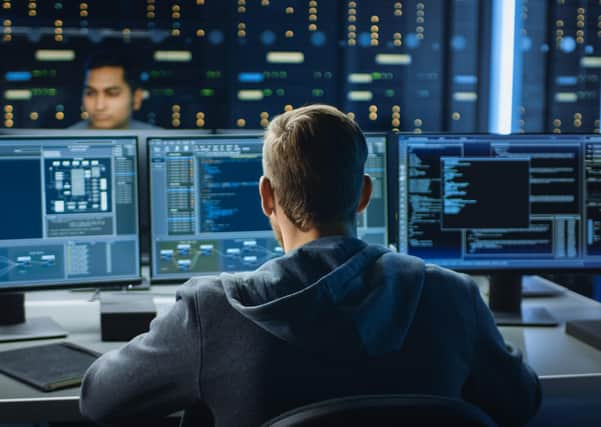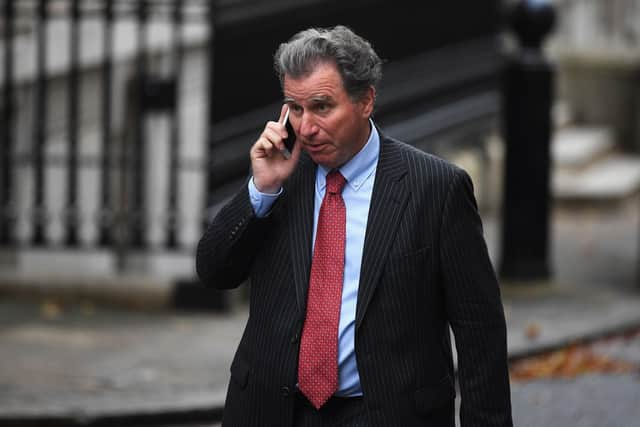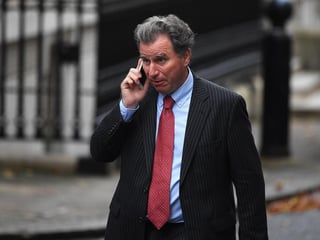Why ex-cabinet minister fears UK is not ready for tech collapse ‘apocalypse’


There cannot be many authors promoting their new book who would cheerfully tell millions of radio listeners, “This is not meant to be a great novel, it may well be terrible – I don’t care”. But as former Cabinet Minister Oliver Letwin added when responding on the Today programme recently to a particularly-scathing review in The Times of his new work Apocalypse How? Technology and the Threat of Disaster, he has a very different ambition to winning literary praise: “What I care about is the message I’m trying to get across.”
Letwin’s book is intended to be a “modern-day parable”, switching between a fictionalised account of what would happen to British society in the event of a collapse of internet-reliant national infrastructure set in 2037 and factual explanations of the current global lack of effective contingency plans should such a scenario occur.


Advertisement
Hide AdAdvertisement
Hide AdSpeaking to The Yorkshire Post last month before the publication of the book and the damning Times review by Hugo Rifkind (sample quote: “A colleague of mine once argued that all opinion columns are either obvious or deranged. Apocalypse How? manages to be both at once”), Letwin says he had a simple aim with what he has written – to start a public conversation about the issue and encourage Government to act.
“I recognise that it is always going to be difficult to make this a high-profile political issue because there is always something more urgent to do. But I hope by publishing the book and giving talks about it, the profile will rise somewhat and it will be possible to interest the Government in doing more to protect the UK.”
The world is becoming ever more dependent on technology – a process that will be sped up as the rollout of 5G connectivity that will not only allow films to be downloaded in seconds but also support smart vehicles to communicate with each other and even monitor people’s health in real time, to give just two examples.
Letwin’s concern is that as the systems that govern and shape our lives become ever-more interconnected and reliant to a large degree on the same underlying networks, we are drastically unprepared for unanticipated outages and that even a problem lasting just a few days could cause a breakdown in law and order and result in thousands of deaths.
Advertisement
Hide AdAdvertisement
Hide AdThe imagined scenario of the book is of a solar storm knocking out electrical systems – such solar weather is known as a ‘Carrington event’ after one of the astronomers who recorded a geomagnetic storm in 1859 which would have caused widespread outages of the electrical grid in the modern world.
“I did that for a reason – there are many, many possible causes,” explains Letwin. “That is part of the problem, once everything depends on essentially one set of things, those set of things can be attacked by man and by nature from many different angles and in many different ways. You can’t tell where the problem is going to arise from and you can’t therefore spend much time worrying about the cause, you have to worry about the effect and try to minimise them. The reason I chose a natural event rather than a manmade one while there have many quite effective cyber-attacks which could do this quite easily we know that grids can be knocked over by space weather.
“It is not a question of if but when. We don’t know how big it will be and which part of the world it might effect. I chose something that there is a very high chance that at sometime, somewhere this it will happen. You can’t have defences against space weather. In the foreseeable future, we are not going to be able to control the Sun. Therefore you have to think about this in terms of a response. But it is just one of the things that might cause this.”
So how worried should people actually be? “Should people be getting into a blind panic that something catastrophic is going to happen tomorrow? No. It is very unlikely anything like this will happen tomorrow. But should people be taking this seriously and making sure somebody is actually preparing to deal with this? Yes. The consequences could be severe.”
Advertisement
Hide AdAdvertisement
Hide AdHis inspiration for the book came from his insight as a Cabinet Minister at the heart of British Government. For six years under David Cameron he was a member of the National Security Council with responsibility for the UK’s national resilience. As well as involvement in reactive responses to issues like flooding, an annual resilience review was established to help better understand potential problems requiring preventative measures. “The things that most concerned me were those that had high impact rather than high probability. Things that have a monumental impact – a meteor hitting the Earth or nuclear Armageddon or something – weren’t going to be worth thinking about too much because there is not too much you can do about them.
“The thing which stood out that needed a great deal of work was this very issue of networks. Gradually we are converging and getting more and more dependent on fewer and fewer networks. It became clear to me that what we hadn’t got properly under control was what to do in the event of a problem.
“There is an experience which was instructional in this - I discovered in my work that there were plans which previous Governments had set up under emergency powers legislation. There was a terrible scare about oil tanker drivers going back on strike due to an industrial dispute.
“What you want is not to have an emergency and we began devising plans to deal with the tanker drivers’ strike in a way that wouldn’t lead to an emergency, that wouldn’t paralyse most of Britain. We developed such plans and that may have been part of the reason there never was a strike because I think they realised maybe it wasn’t worth having a strike.
Advertisement
Hide AdAdvertisement
Hide Ad“That made me think in relation to the networks what we really need is something that will stop the networks going down, the grid going down, being an emergency. It will always be a frightful nuisance but you might be able to stop it being a real emergency. That was one of the things that gave rise to the book.”
The fictional section of the books includes imagined scenes of the future Prime Minister holding crisis meetings as hospitals struggle to cope without technology and social care rapidly collapses.
“One of the things I wanted to ensure was not to over-dramatise it and to make clear that actually, the processes in these sorts of circumstances run fairly smoothly and sensibly - the issue is have you got plans in place that enable these processes to actually have some beneficial effect.
“Although it is entirely fictional and in the future, I have tried to make it feel as much as what it felt like to me as I could.”
Advertisement
Hide AdAdvertisement
Hide AdLetwin, who has been an investment banker and an academic at Cambridge and Princeton universities and was famously dubbed ‘Gandalf’ in Tory circles thanks to his key role in developing Conservative policies under David Cameron, has a reputation as an intellectual but his general solution for preparing for potential network failures is strikingly simple – a ‘make do and mend’ approach involving the upkeep of recent technology not reliant on modern networks such as upkeeping landline phone networks which could be used on a temporary basis in the result of system failure.
“There is not too much people can really do by themselves. Obviously you can take sensible precautions like having torches around. But there isn’t much one can do to overcome these.
“Everything depends on these networks if you are living in the modern way in the modern world. You could obviously go off and live in a hut in the Outer Hebrides disjoined from all the networks but there are disadvantages of that - it is difficult to find work for example.
“This is really the responsibility of government because the commercial firms don’t have a commercial incentive to prepare for these things. Individuals can’t do it and therefore government has to take the steps necessary, often by putting down simple regulatory rules. Once such an event occurs, it is all very different. However prepared we all are, actually it will depend on a very large number of people being sensible and co-operative and actually people are very good at doing that. People have a strong innate tendency to make do and mend and support one another in these circumstances. All we need to do is to make it relatively easy for them to support each other and in the end they will. And of course Yorkshire has a fine tradition of make do and mend.”
Advertisement
Hide AdAdvertisement
Hide AdOne of the bolder suggestions in the book is the creation of a new convention on global network protection to parallel the Geneva human rights convention. Letwin admits such a measure is unlikely to come to fruition in the near future.
“I think we are quite a long way from it for all sorts of reasons which have to do with the intense global tensions about not just the networks and cyber attacks and all of that.
“There are a great deal of discussions going on about this. But first of all it is very vexed because different countries have different agendas and views, secondly it is very complicated and finally it has been focusing mainly on a serious question but different to mine which is how should international law apply to cyber attacks and cyber defence and so on? It is different from the question of how does the whole world have a fallback solution available in each country. We are a long way from that because at the moment that is not on the agenda.”
Given the concerns the book raises about the vulnerability of the UK’s networks, it is intriguing that Letwin is a strong supporter of the Government involving the Chinese communications giant Huawei in the nation’s 5G infrastructure.
Advertisement
Hide AdAdvertisement
Hide Ad“I think the decision is absolutely right. My strong belief is the so-called security worries raised by the United States are nothing of the kind. They are actually because America is trying to defend its professional interests because no American firm has the relevant technology yet whereas we and the Chinese between us do.
“When I was involved at an earlier stage of the decision about Huawei involvement, it became clear to me talking to the experts that we actually had better visibility of what they were up to and more likelihood of being able to prevent ourselves being subject to problems from China if we did allow them in and involved ourselves in their activities. It is quite interesting that people are more worried about this than any number of other things that are much more likely to happen.”
Letwin to talk about book in Yorkshire
Oliver Letwin is to discuss his book at the Ikley Literature Festival next week.
He will appear at All Saints’ Church in Ilkley on Thursday, March 19, with the event starting at 6pm.
Advertisement
Hide AdAdvertisement
Hide AdAnother announced festival date will see Emma Smith, Professor of Shakespeare Studies at Hertford College, Oxford, discussing the ambiguities of Shakespeare’s plays on Thursday, April 30, at the same venue. In ,This Is Shakespeare,,
Smith encourages us to revise our preconceptions of Shakespeare and introduces us to a radical new way of looking at The Bard.
Tickets are available from the Ilkley Literature Festival Box Office on 01943 816714 or via www.ilkleyliteraturefestival.org.uk/whats-on/special-events.
Comment Guidelines
National World encourages reader discussion on our stories. User feedback, insights and back-and-forth exchanges add a rich layer of context to reporting. Please review our Community Guidelines before commenting.
